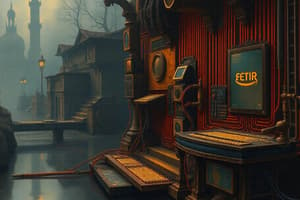Podcast
Questions and Answers
What is the primary function of secondary storage in a computer system?
What is the primary function of secondary storage in a computer system?
- To manage user input and commands directly
- To maintain temporary data during running applications
- To execute application software efficiently
- To store data persistently even when the computer is turned off (correct)
Which of the following statements accurately describes an operating system's role?
Which of the following statements accurately describes an operating system's role?
- It handles the execution, management, and termination of application software. (correct)
- It provides the physical components required for computing tasks.
- It only manages user interfaces without controlling any other functions.
- It generates energy to power the hardware components of the computer.
Which of the following is a characteristic of a Graphical User Interface (GUI)?
Which of the following is a characteristic of a Graphical User Interface (GUI)?
- It relies on typed commands to perform tasks.
- It only allows for the execution of single-threaded applications.
- It utilizes text-based interfaces for user interaction.
- It incorporates visual elements such as windows and icons for ease of use. (correct)
What would happen if a computer system had only an operating system and no application software?
What would happen if a computer system had only an operating system and no application software?
Which of the following operating systems is NOT mentioned as an example?
Which of the following operating systems is NOT mentioned as an example?
What is the main function of the Central Processing Unit (CPU) in a computer system?
What is the main function of the Central Processing Unit (CPU) in a computer system?
Which of the following statements about RAM is correct?
Which of the following statements about RAM is correct?
What is the significance of the relationship between hardware and software in a computer system?
What is the significance of the relationship between hardware and software in a computer system?
Which of the following statements accurately describes the measurement of CPU speed?
Which of the following statements accurately describes the measurement of CPU speed?
What role does the motherboard play in a computer system?
What role does the motherboard play in a computer system?
Flashcards are hidden until you start studying
Study Notes
Hardware & Software
- Hardware refers to the physical components of a computer, like a monitor, keyboard, or CPU.
- Software comprises instructions that tell hardware what to do, existing as coded information.
- Software requires hardware to function, while hardware requires software to be useful.
Computer Components
- The CPU, or Central Processing Unit, is the "brain" of the computer, executing software instructions.
- CPUs are typically measured in Hertz (Hz), with higher numbers indicating greater processing speeds.
- Main memory, also called primary storage, temporarily stores data and instructions for processing by the CPU.
Random Access Memory (RAM)
- RAM is a volatile form of main memory, meaning data stored within it is lost when the computer is powered off.
Secondary Storage
- Secondary storage, like hard drives, CD-ROMs, and USB drives, provides non-volatile storage, meaning data persists even after the computer is turned off.
Operating System
- An operating system manages various aspects of a computer system, providing a user interface, managing applications, controlling files, and managing memory.
User Interfaces
- Graphical User Interface (GUI) provides a visual environment with windows, icons, menus, and a pointer for easy interaction.
- Command-Line Interface (CLI) requires users to input commands through text, typically used in older or less powerful computers.
Input Devices
- A scanner captures images or documents.
- Digital Cameras capture still images and store them on internal memory cards.
- Video Cameras capture moving images.
- A Webcam provides real-time video input, often used for communication.
- A microphone converts sound into electrical signals for processing.
Output Devices
- CRT Monitors display text and images, though they're becoming less common due to bulkiness and weight.
- Flat-Screen Monitors (LCD/TFT), are lighter, thinner, and provide good image quality.
- Digital Projectors display images onto larger surfaces, such as screens or walls.
- Loudspeakers convert electrical signals into audible sound waves.
Data Storage
- Main memory (RAM and ROM) stores data temporarily.
- Backing storage is the name for non-volatile storage devices, including hard drives and CD-ROMs, which store data permanently.
Backups
- Backups create copies of data to prevent loss in case of hardware failure or data corruption.
- Regular backups are essential for businesses and individuals alike.
- Backup data should be stored in a secure location, ideally off-site.
Studying That Suits You
Use AI to generate personalized quizzes and flashcards to suit your learning preferences.



